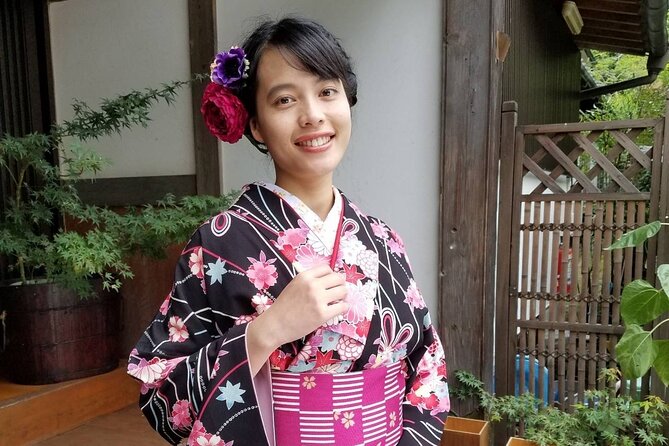In Tokyo, sake enthusiasts can enjoy a unique and educational experience called ‘Tasting ALL TYPES of Sake With Seminar’. Led by the knowledgeable and personable guide, Aki, participants embark on a journey to explore the nuances and complexities of this traditional Japanese rice wine.
The seminar includes three different types of sake, each accompanied by detailed explanations on how to properly appreciate and enjoy them.
With rave reviews and a perfect 5-star rating, this informative and enjoyable seminar is a must-try for both sake connoisseurs and those curious to learn more.
Quick Takeaways

- Sake is a Japanese alcoholic drink also known as rice wine.
- Tasting session with a sake sommelier in Tokyo.
- Detailed explanations on how to drink three types of sake.
- Boost your sake knowledge and eliminate language barriers.
The Delight of Junmai Sake
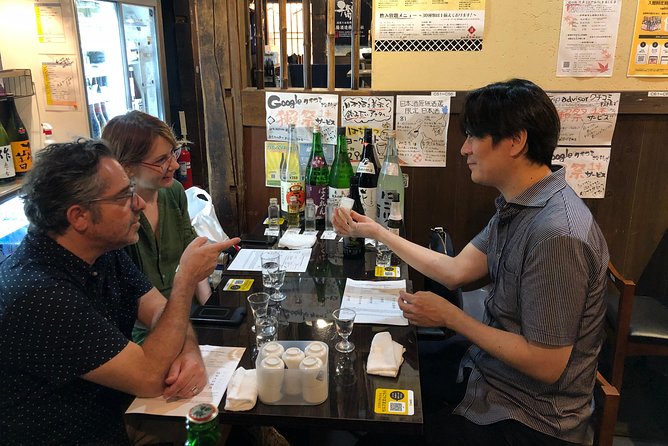
Participants in the sake tasting seminar can experience the delight of Junmai Sake, as the sommelier provides detailed explanations on how to drink and appreciate this type of sake. Junmai Sake has a rich history that dates back centuries in Japan. It’s made using only rice, water, yeast, and koji, with no added alcohol or sugar. This purity gives Junmai Sake a clean and robust flavor profile.
During the seminar, you will also learn about the art of pairing Junmai Sake with different types of cuisine. Junmai Sake’s versatile nature allows it to complement a wide range of dishes, from sushi and sashimi to grilled meats and vegetables. The sommelier will guide participants in understanding the unique characteristics of Junmai Sake and how it can enhance the flavors of various cuisines.
Exploring the World of Ginjo Sake
The sommelier at the sake tasting seminar explores the world of Ginjo Sake, providing insights and explanations on its production process and unique flavor profiles.
Ginjo Sake is a premium type of sake that’s made with highly polished rice, resulting in a smooth and delicate flavor.
The brewing process for Ginjo Sake involves a longer fermentation period at lower temperatures, which brings out more complex and fruity aromas.
The unique flavor profiles of Ginjo Sake make it a versatile drink that pairs well with a variety of foods, including seafood, grilled meats, and sushi.
The sommelier will guide participants through a tasting of different Ginjo Sake varieties, explaining the characteristics of each and recommending food pairings to enhance the overall experience.
Unveiling the Richness of Daiginjo Sake
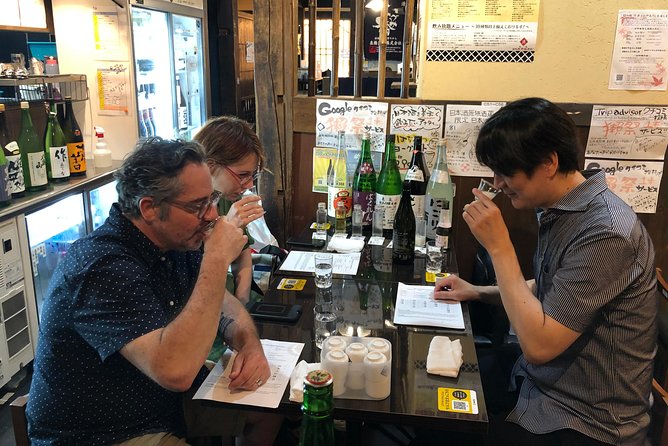
The sommelier enthusiastically reveals the intricacies and velvety smoothness of Daiginjo Sake, allowing participants to appreciate its richness and complexity.
This current discussion topic focuses on the pairing of Daiginjo Sake with different types of cuisines and explores the process of brewing Daiginjo Sake and its significance in Japanese culture.
Daiginjo Sake, known for its high quality and refined taste, is brewed using a labor-intensive process that involves polishing the rice grains to remove impurities. This results in a sake that’s exceptionally smooth and aromatic.
The seminar will delve into the art of pairing Daiginjo Sake with various dishes, highlighting the way its flavors complement and enhance different flavors and textures.
Plus, you will learn about the cultural significance of Daiginjo Sake in Japanese traditions and celebrations.
Discovering the Secrets of Nigori Sake

In their quest to uncover the secrets of Nigori Sake, the participants eagerly explore the unique characteristics and production methods of this traditional Japanese beverage. Here are some key points to consider:
- Nigori sake production process: Participants delve into the intricate process of making Nigori sake, which involves a special filtration technique that leaves some sediment behind, resulting in a cloudy appearance and a creamy, textured taste.
- Pairing food with Nigori sake: The participants learn about the art of pairing Nigori sake with various dishes. They discover that this sake’s rich and robust flavors complement well with spicy, savory, and umami-rich foods, such as sushi, tempura, and grilled meats.
- Exploring flavor profiles: Through guided tastings, the participants explore the diverse flavor profiles of Nigori sake, ranging from sweet and floral to nutty and earthy. They gain a deeper understanding of the different brewing styles and ingredients that contribute to these flavors.
- Appreciating the cultural significance: As they delve into the secrets of Nigori sake, the participants also gain insights into the cultural significance of this beverage in Japanese society. They learn about the rituals and traditions associated with its consumption, further deepening their appreciation for this traditional drink.
Diving Into the Complexity of Honjozo Sake
An expert sake sommelier is leading a seminar that dives into the complexity of Honjozo Sake, offering participants a unique opportunity to explore the intricacies of this traditional Japanese rice wine.
During the seminar, attendees will learn about the Honjozo sake brewing process, which involves using a specific ratio of rice, water, and koji mold. This process creates a sake that’s crisp, dry, and light-bodied, with a delicate aroma and flavor profile.
Participants will also discover the art of pairing Honjozo sake with various foods, as different types of sake can complement and enhance different dishes.
Embracing the Uniqueness of Futsu-shu Sake
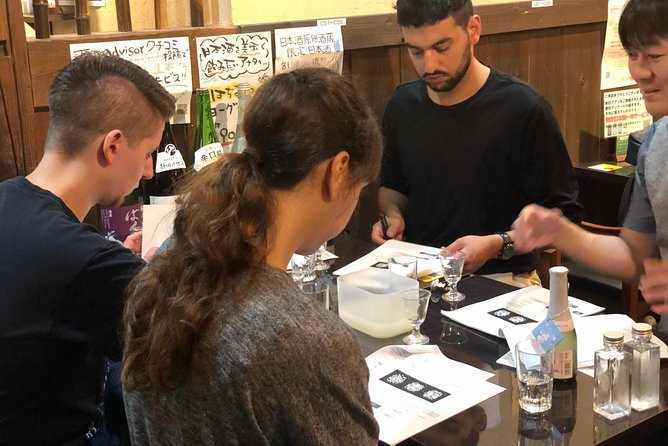
Participants in the seminar are encouraged to embrace and appreciate the uniqueness of Futsu-shu sake, as it offers a distinct flavor profile and a versatile range of food pairings.
Futsu-shu sake is a type of sake that’s made through a simpler brewing process compared to other types. It’s known for its affordability and accessibility, making it a popular choice among sake enthusiasts. Understanding the brewing process of Futsu-shu sake allows participants to gain insights into the craftsmanship behind this traditional Japanese beverage.
Appreciating the different flavor profiles of Futsu-shu sake helps develop a refined palate and a deeper appreciation for the complexities of sake.
Unearthing the Hidden Gems of Aged Sake
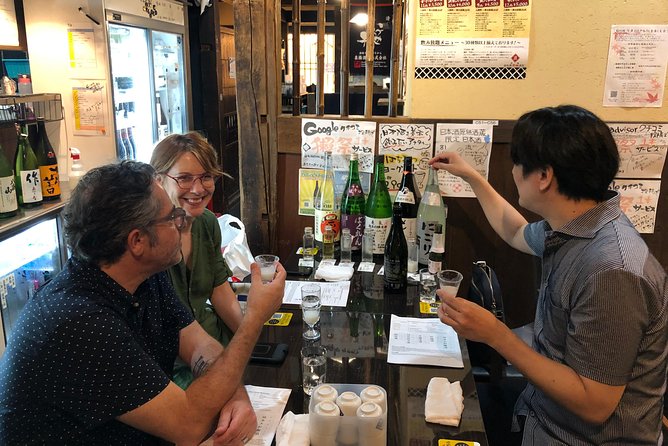
Aki, the sake sommelier, uncovers the exquisite flavors and complexities of aged sake, revealing the hidden gems that lie within. Aged sake, also known as koshu, undergoes a unique aging process that sets it apart from other types of sake. During this process, the sake is carefully stored and allowed to mature, resulting in a distinct flavor profile that evolves over time. The aging process imparts rich and deep flavors to the sake, with notes of caramel, nuttiness, and umami. Each bottle of aged sake tells a story, with the flavors reflecting the years of careful craftsmanship. From the smooth and elegant taste of a 10-year-old koshu to the deep complexity of a 30-year-old vintage, aged sake offers a truly remarkable drinking experience. So next time you’re looking to explore the world of sake, don’t forget to uncover the hidden gems of aged sake and indulge in its unique flavor profiles.
| Age | Flavor Profile |
|---|---|
| 10 years | Smooth and elegant with hints of caramel |
| 20 years | Rich and complex with nutty undertones |
| 30 years | Deep and intense with notes of umami |
| 40 years | Velvety and refined with a lingering finish |
| 50 years | Rare and extraordinary, a true masterpiece |
Frequently Asked Questions
What Is the Duration of the Tasting Session With the Sake Sommelier in Tokyo?
The duration of the tasting session with the sake sommelier in Tokyo is not provided. The Tasting session experience offers detailed explanations on how to drink three types of sake.
Can Participants Bring Their Own Snacks or Beverages to the Tasting Session?
Participants cannot bring their own snacks or beverages to the tasting session. The experience includes snacks and water provided by the organizer. Outside food and drinks are not allowed to ensure a consistent and controlled tasting environment.
Is the Tasting Session Suitable for Beginners Who Have Little to No Knowledge About Sake?
The tasting session is suitable for beginners with little to no knowledge about sake. It provides an introduction to sake tasting, allowing participants to learn and explore different types of sake.
Are There Any Restrictions or Requirements for Participants, Such as Age Restrictions or Dress Code?
There are no age restrictions or dress code requirements for participants. The seminar is suitable for beginners with little to no knowledge about sake, making it accessible to all interested individuals.
Can Participants Purchase Bottles of Sake to Take Home After the Tasting Session?
Participants have the option to purchase bottles of sake and take them home after the tasting session. This allows them to continue enjoying and exploring the different types of sake at their own leisure.
The Sum Up
The ‘Tasting ALL TYPES of Sake With Seminar’ bookable on Viator is a highly recommended experience for sake enthusiasts and those looking to learn more about this traditional Japanese beverage.
Led by the knowledgeable and personable guide, Aki, participants are taken on a journey to explore the nuances and complexities of sake.
With rave reviews and a perfect 5-star rating, this seminar provides an informative and enjoyable opportunity to discover the world of sake.
Don’t miss out on this unique and educational experience in Tokyo.

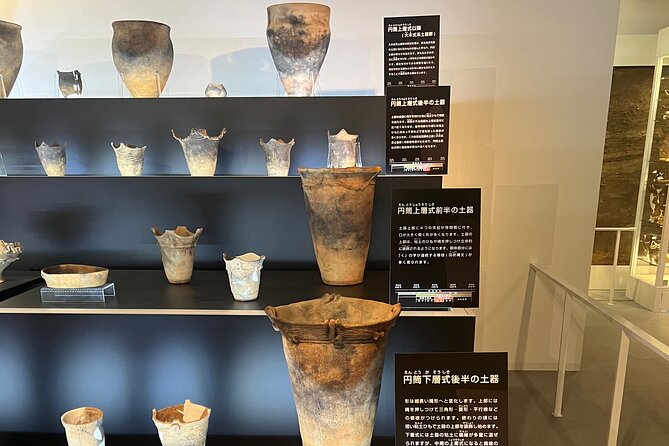
![[Miyakojima Snorkel] Private Tour From People Enjoy From Years Old! Enjoy Nemo, Coral and Miyako Quick Takeaways](https://tokyo-top-guide.com/wp-content/uploads/miyakojima-snorkel-private-tour-from-2-people-enjoy-from-3-years-old-enjoy-nemo-coral-and-miyako.jpg)

